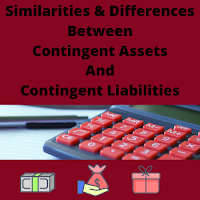Similarities & Differences Between Contingent Assets And Contingent Liabilities
Contingent Assets VS Contingent Liabilities
Contingent Assets Example
For example, if a company filed a case in court for claiming the rights of content, then the copyright will be a contingent asset for the company that will arise on the happening of future
event i.e, either the company prove that it has legal owner of the content or it may fail to prove it. When the court makes a judgement that the company has legal owner of the content then such copyright (intangible asset)
is recorded in company financial statements and it is now no longer be existed as a contingent asset.
Contingent Liabilities Example
If a company has a dispute with supplier company for goods purchased on account and the supplier company filed a case against the company to pay it the specified amount. Then there is a Contingent Liability for the company to pay to the supplier company if it will lose the case.
Disclosure of Contingent Assets Contingent Liabilities In Financial Statements
According to IAS-37:
When it is certain that the event is occurred, then it is no longer be treated as a contingent asset rather than it is treated as a Current Asset. On the happening of the event, a contingent liability is also no longer be existed and treated as a Current Liability for the business and shown on the balance sheet.
A company is required to disclose about both contingent assets and contingent liabilities in the notes to the financial statements.
Similarities Between Contingent Assets And Contingent Liabilities
Both depend upon future uncertain event that may or may not occur.
Both are reported in Notes To The Accounts In Financial Reports and not recorded and recognized in books of accounts.
Both are no longer exits when it is clear that these are arised.

Comments